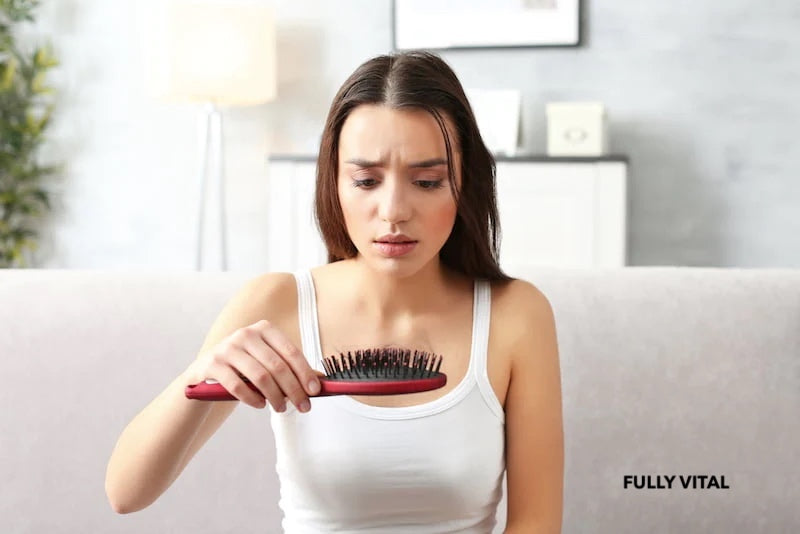
Iodine: Unlocking The Secrets To Healthy Hair Growth
Welcome to our blog page dedicated to all things hair growth! In this article, we'll dive deep into the topic of iodine and its role in stimulating healthy hair growth.
Whether you're a woman with curly, straight, or wavy hair, we've got you covered.
So, let's get started and uncover the secrets of iodine!

I LOVE MY HAIR NOW
FullyVital hair serum and hair vitamins made tremendous improvements in my hair. I truly love my hair now.
Dorit S.,
What Is Iodine?
Iodine is a vital mineral that plays a crucial role in various bodily functions.
It is an essential component of thyroid hormones, which regulate metabolism and contribute to hair growth.
Our bodies do not naturally produce iodine, so we need to obtain it through our diet or supplements.(1)

Why Is Iodine Important?
Iodine is essential for maintaining healthy hair growth.
It helps to regulate the functioning of the thyroid gland, which produces hormones that influence the growth and development of hair follicles.
Insufficient iodine levels may lead to hair loss or thinning hair.(2)
How Does Iodine Work?
Iodine supports hair growth by ensuring optimal thyroid function.
The thyroid gland produces hormones that control the metabolic rate of cells, including those in hair follicles.
These hormones help regulate the hair growth cycle, promoting the growth of strong and healthy hair.
What Are The Benefits Of Iodine?
Here are some key benefits of iodine for hair growth:
Promotes Hair Growth
Adequate iodine levels support the healthy growth of hair follicles, leading to stronger and fuller hair.
Prevents Hair Loss
Iodine deficiency can contribute to hair loss.
By ensuring sufficient iodine intake, you can reduce the risk of hair thinning or excessive shedding.
Enhances Hair Strength
Iodine helps strengthen the hair shaft, making it more resistant to damage and breakage.
Improves Scalp Health
Iodine has antiseptic properties that can promote a healthy scalp environment, preventing scalp issues that may hinder hair growth.
Boosts Shine And Luster
Healthy iodine levels contribute to vibrant and lustrous hair, giving it a natural shine.
Are There Any Downsides To Iodine?
While iodine is essential for hair growth, excessive intake can have adverse effects.
It is important to maintain a balance and not exceed the recommended daily intake.
Here are a few potential downsides to be aware of:
Thyroid Imbalance
Excessive iodine intake can disrupt thyroid function, leading to hyperthyroidism or hypothyroidism.
Allergic Reactions
Some individuals may be allergic to iodine and may experience allergic reactions when exposed to it.
Medication Interactions
Certain medications, such as lithium or amiodarone, can interact with iodine, so it's important to consult with your healthcare provider if you're taking any medications.
What Are The Alternatives To Iodine?
If you prefer to explore alternatives to iodine for promoting hair growth, here are a few options worth considering:
Biotin
Biotin, also known as vitamin B7, is a popular supplement for supporting healthy hair, skin, and nails.
Zinc
Zinc deficiency can contribute to hair loss. Supplementing with zinc may help promote hair growth and prevent hair thinning.
Iron
Iron deficiency is a common cause of hair loss. Adequate iron levels are crucial for healthy hair growth.
Omega-3 Fatty Acids
Found in fatty fish, flaxseeds, and walnuts, omega-3 fatty acids can support scalp health and hair growth.
How Is Iodine Classified In The Periodic Table?
Iodine is a chemical element with the symbol I and atomic number 53.
It belongs to the halogen group, which is located in Group 17 of the periodic table.
Halogens are highly reactive nonmetals that form various compounds with other elements.
Iodine is the heaviest and least reactive element among the halogens.
Are There Any Other Common Uses Of Iodine?
Iodine has a wide range of applications beyond its importance in promoting hair growth.
Here are some common uses of iodine:
Disinfectant
Iodine is used as an antiseptic in healthcare settings to disinfect wounds, surgical tools, and skin before surgery.
Water Purification
Iodine is employed in water treatment to kill bacteria, viruses, and parasites, making it safe for consumption.
Radiographic Contrast Agent
In medical imaging, iodine-based contrast agents are used to enhance the visibility of organs and blood vessels during X-rays or CT scans
Food Industry
Iodine is added to table salt to prevent iodine deficiency and ensure proper thyroid function in the population.
Chemical Reagent
Iodine is utilized as a reagent in various chemical reactions, laboratory tests, and analytical methods.
How Is Iodine Extracted From Natural Sources?
Iodine can be extracted from different natural sources, primarily from seawater and underground brines.
Here's a general overview of the extraction process:
Seawater Extraction
Seawater contains trace amounts of iodine.
It is first collected and concentrated in large pools called evaporation ponds.
- Seawater is pumped into these ponds and exposed to sunlight and wind, promoting evaporation.
- As water evaporates, the iodine concentration increases.
- Once the concentration is sufficient, the remaining solution is treated with chemicals to precipitate iodine crystals.
- The crystals are then collected, washed, and purified to obtain pure iodine.
Underground Brine Extraction
Certain underground deposits, such as those found in salt domes or wells, contain brines rich in iodine.
- Brine is pumped to the surface and undergoes a series of filtration and purification steps.
- The brine is treated with oxidizing agents to convert iodide ions into iodine.
- The resulting iodine is further processed to remove impurities and obtain the final iodine product.
Can Excessive Iodine Intake Be Harmful?
Yes, excessive iodine intake can have adverse effects on health.
It is important to maintain a balance and avoid exceeding the recommended daily intake.
Here are some potential risks of excessive iodine consumption:
Thyroid Dysfunction
High levels of iodine can disrupt thyroid function, leading to hyperthyroidism or hypothyroidism.
Autoimmune Thyroiditis
Excessive iodine intake may trigger or worsen autoimmune thyroid diseases, such as Hashimoto's thyroiditis or Graves' disease.
Goiter Formation
In some cases, excessive iodine can cause the thyroid gland to enlarge, resulting in a condition known as goiter.
Thyroid Cancer
Prolonged exposure to high iodine levels may increase the risk of thyroid cancer, although this risk is relatively low.
Can Iodine Have An Impact On Pregnancy And Fetal Development?
Yes, iodine plays a crucial role in pregnancy and fetal development.
Adequate iodine levels are essential for the healthy growth and development of the baby.
Here are some key points to consider:
Thyroid Hormone Production
Iodine is necessary for the production of thyroid hormones, which are crucial for the developing baby's brain development and overall growth.
Maternal Health
During pregnancy, the demand for iodine increases.
Insufficient iodine intake can lead to maternal thyroid dysfunction and may have adverse effects on both the mother and the baby.
Neurological Development
Iodine deficiency during pregnancy can result in intellectual and developmental disabilities in the child, known as congenital hypothyroidism.
Miscarriage And Stillbirth
Severe iodine deficiency increases the risk of miscarriage, stillbirth, and other pregnancy complications.
What Is The History Of Iodine And How Has It Impacted Hair Growth?
Iodine has a rich history dating back centuries.
Let's explore how its significance in promoting hair growth has been recognized over time:
Ancient Use
Ancient civilizations, such as the Egyptians and Greeks, documented the use of seaweed (a natural source of iodine) for its medicinal properties, including promoting healthy hair.
Discovery
In 1811, the French chemist Bernard Courtois discovered iodine while extracting sodium carbonate from seaweed ashes.
This breakthrough paved the way for further research on iodine's properties and benefits.(3)
Iodine Deficiency Awareness
The understanding of iodine's crucial role in preventing goiter (enlarged thyroid gland) and promoting overall health led to the introduction of iodized salt in the early 20th century, reducing iodine deficiency disorders globally.
Hair Growth Connection
Over time, researchers discovered the connection between iodine, thyroid function, and hair growth.
Today, iodine is recognized as an essential element for maintaining healthy hair.(4)
How Does Iodine Contribute To Hair Growth Products In The Current Environment?
In the current market landscape, iodine's importance in hair growth products is gaining recognition.
Here's why iodine is a significant topic for hair growth product companies:
Scientific Research
Ongoing scientific studies continue to shed light on the positive impact of iodine on hair growth.
Research highlights the role of iodine in supporting healthy thyroid function and the hair growth cycle.(5)
Consumer Demand
With an increasing focus on natural and effective hair care solutions, consumers are seeking products that harness the benefits of iodine.
Hair growth product companies are responding to this demand by incorporating iodine into their formulations.
Hair Care Innovations
Companies are leveraging the knowledge of iodine's role in hair growth to develop innovative products that specifically target hair loss, thinning hair, and overall hair health.
Holistic Approach
Hair growth product companies are recognizing the importance of a holistic approach to hair care.
By addressing underlying factors such as nutrition and thyroid health, iodine-containing products contribute to comprehensive hair growth solutions.
What Are The Advancements And Possibilities For Iodine In The Future Regarding Hair Growth?
As we look ahead, the future of iodine in the realm of hair growth holds exciting possibilities.
Here are some potential advancements to anticipate:
Advanced Formulations
Ongoing research and development may lead to enhanced formulations that maximize the benefits of iodine for hair growth.
This includes optimized delivery systems, increased bioavailability, and synergistic combinations with other hair-nourishing ingredients.
Personalized Solutions
The future may bring personalized approaches to hair growth, utilizing iodine levels and individual factors to tailor products and recommendations for optimal results.
Scientific Exploration
Continued exploration of iodine's mechanisms of action and its interaction with hair follicles may uncover new insights, paving the way for breakthrough treatments and interventions in the field of hair growth.
Unlock the Power of Healthy Hair with Fully VitalAt Fully Vital, we understand the importance of a vibrant and healthy relationship with your locks. Say goodbye to the worries of aging hair and embrace a revitalized mane with our science-backed hair growth products.
|
Final Thoughts On Iodine
Iodine plays a crucial role in promoting healthy hair growth and maintaining the vitality of your locks.
Understanding the importance of iodine and its impact on hair health can empower you to make informed decisions about nourishing your hair from within.
At Fully Vital, we are passionate about creating science-backed hair growth products that combat the effects of aging on your hair.
Our mission is to help you slow down and reverse the signs of hair aging, allowing you to cultivate a healthier relationship with your locks.
Discover the power of Fully Vital's hair growth products and unlock the potential of your hair.
Embrace the journey towards a more vibrant and youthful mane.
Together, let's celebrate the beauty and confidence that come with healthy, revitalized hair.
Frequently Asked Questions About Iodine
Can iodine alone cure hair loss?
No, iodine is not a miracle cure for hair loss.
While it is an essential mineral for healthy hair growth, various factors can contribute to hair loss, such as genetics, hormonal imbalances, or underlying health conditions.
It is important to address the root cause of hair loss and adopt a comprehensive approach to promote hair growth.
How can I incorporate Iodine into my diet?
Iodine can be obtained from various food sources, including seaweed, seafood (such as shrimp or cod), dairy products, eggs, and iodized salt.
If you're considering iodine supplementation, it's best to consult with a healthcare professional for personalized advice.
Can iodine deficiency cause hair thinning?
Yes, inadequate iodine levels can contribute to hair thinning.
When the thyroid gland doesn't receive enough iodine, it may produce fewer thyroid hormones, which can disrupt the hair growth cycle and lead to hair loss.
Are there any signs of iodine deficiency to watch out for?
Some common signs of iodine deficiency include fatigue, weight gain, dry skin, hair loss, and a feeling of coldness.
However, these symptoms can also be indicative of other health conditions, so it's important to consult with a healthcare provider for a proper diagnosis.
Can iodine supplements interact with other medications?
Yes, iodine supplements can interact with certain medications, such as lithium or amiodarone.
It's essential to inform your healthcare provider about any supplements you're taking to avoid any potential interactions.
Is iodine a metal?
No, iodine is not a metal.
It is a chemical element classified as a nonmetal.
Where is iodine found in food?
Iodine can be found naturally in various food sources, including:
- Seafood: Seaweed, fish, and shellfish are rich sources of iodine.
- Dairy Products: Milk, cheese, and yogurt often contain iodine due to iodine-rich animal feed or iodized sanitizing agents used in dairy processing.
- Iodized Salt: Table salt fortified with iodine is a common source of iodine in many diets.
Why do doctors put iodine on you?
Doctors use iodine as an antiseptic agent before surgical procedures to reduce the risk of infection.
It helps to kill bacteria on the skin's surface and minimize the chances of contamination.
How do you know if you need iodine?
Determining if you need iodine requires a comprehensive assessment by a healthcare professional.
They may consider factors such as your overall health, dietary habits, and geographical location.
Some indications that you may require iodine supplementation or further evaluation include:
- Thyroid Dysfunction: Symptoms of an underactive thyroid (hypothyroidism) or an overactive thyroid (hyperthyroidism) could suggest a need for iodine assessment.
- Geographical Factors: Individuals residing in regions with iodine-deficient soils may be at a higher risk of iodine insufficiency.
- Pregnancy or Lactation: Pregnant and breastfeeding women have increased iodine requirements to support the healthy development of their baby's thyroid gland.
What organ is iodine most important?
Iodine is essential for the proper functioning of the thyroid gland.
The thyroid uses iodine to produce thyroid hormones, which play a vital role in regulating metabolism, growth, and development.
However, iodine also has various other functions throughout the body, including supporting neurological development, immune function, and overall cellular health.
Sources:
- National Institutes of Health. (2017). Office of Dietary Supplements - Iodine. Nih.gov. https://ods.od.nih.gov/factsheets/Iodine-Consumer/
- Health Benefits of Iodine. (n.d.). WebMD. https://www.webmd.com/diet/health-benefits-iodine
- Bernard Courtois | French chemist. (n.d.). Encyclopedia Britannica. https://www.britannica.com/biography/Bernard-Courtois
- Momčilović, B., Prejac, J., Višnjević, V., Skalnaya, M. G., Mimica, N., Drmić, S., & Skalny, A. V. (2014). Retracted:Hair Iodine for Human Iodine Status Assessment. Thyroid, 24(6), 1018–1026. https://doi.org/10.1089/thy.2012.0499
- Almohanna, H. M., Ahmed, A. A., Tsatalis, J. P., & Tosti, A. (2019). The Role of Vitamins and Minerals in Hair Loss: A Review. Dermatology and Therapy, 9(1), 51–70. https://doi.org/10.1007/s13555-018-0278-6







